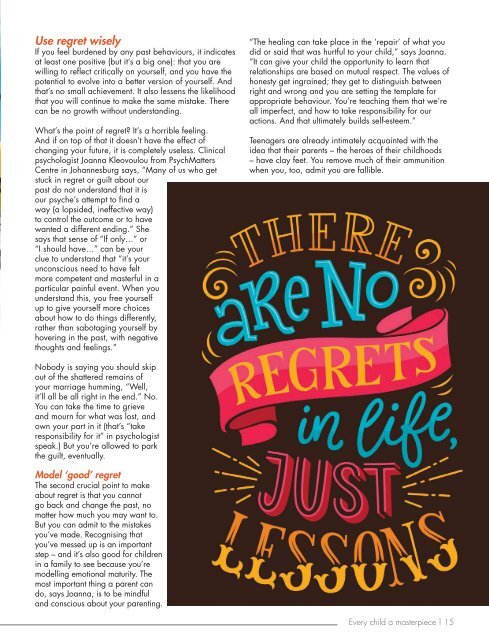CRAWFORD APRIL 2018 ONLINE
You also want an ePaper? Increase the reach of your titles
YUMPU automatically turns print PDFs into web optimized ePapers that Google loves.
Use regret wisely<br />
If you feel burdened by any past behaviours, it indicates<br />
at least one positive (but it’s a big one): that you are<br />
willing to reflect critically on yourself, and you have the<br />
potential to evolve into a better version of yourself. And<br />
that’s no small achievement. It also lessens the likelihood<br />
that you will continue to make the same mistake. There<br />
can be no growth without understanding.<br />
What’s the point of regret? It’s a horrible feeling.<br />
And if on top of that it doesn’t have the effect of<br />
changing your future, it is completely useless. Clinical<br />
psychologist Joanna Kleovoulou from PsychMatters<br />
Centre in Johannesburg says, “Many of us who get<br />
stuck in regret or guilt about our<br />
past do not understand that it is<br />
our psyche’s attempt to find a<br />
way (a lopsided, ineffective way)<br />
to control the outcome or to have<br />
wanted a different ending.” She<br />
says that sense of “If only…” or<br />
“I should have…” can be your<br />
clue to understand that “it’s your<br />
unconscious need to have felt<br />
more competent and masterful in a<br />
particular painful event. When you<br />
understand this, you free yourself<br />
up to give yourself more choices<br />
about how to do things differently,<br />
rather than sabotaging yourself by<br />
hovering in the past, with negative<br />
thoughts and feelings.”<br />
“The healing can take place in the ‘repair’ of what you<br />
did or said that was hurtful to your child,” says Joanna.<br />
“It can give your child the opportunity to learn that<br />
relationships are based on mutual respect. The values of<br />
honesty get ingrained; they get to distinguish between<br />
right and wrong and you are setting the template for<br />
appropriate behaviour. You’re teaching them that we’re<br />
all imperfect, and how to take responsibility for our<br />
actions. And that ultimately builds self-esteem.”<br />
Teenagers are already intimately acquainted with the<br />
idea that their parents – the heroes of their childhoods<br />
– have clay feet. You remove much of their ammunition<br />
when you, too, admit you are fallible.<br />
Nobody is saying you should skip<br />
out of the shattered remains of<br />
your marriage humming, “Well,<br />
it’ll all be all right in the end.” No.<br />
You can take the time to grieve<br />
and mourn for what was lost, and<br />
own your part in it (that’s “take<br />
responsibility for it” in psychologist<br />
speak.) But you’re allowed to park<br />
the guilt, eventually.<br />
Model ‘good’ regret<br />
The second crucial point to make<br />
about regret is that you cannot<br />
go back and change the past, no<br />
matter how much you may want to.<br />
But you can admit to the mistakes<br />
you’ve made. Recognising that<br />
you’ve messed up is an important<br />
step – and it’s also good for children<br />
in a family to see because you’re<br />
modelling emotional maturity. The<br />
most important thing a parent can<br />
do, says Joanna, is to be mindful<br />
and conscious about your parenting.<br />
Every child a masterpiece | 15


















